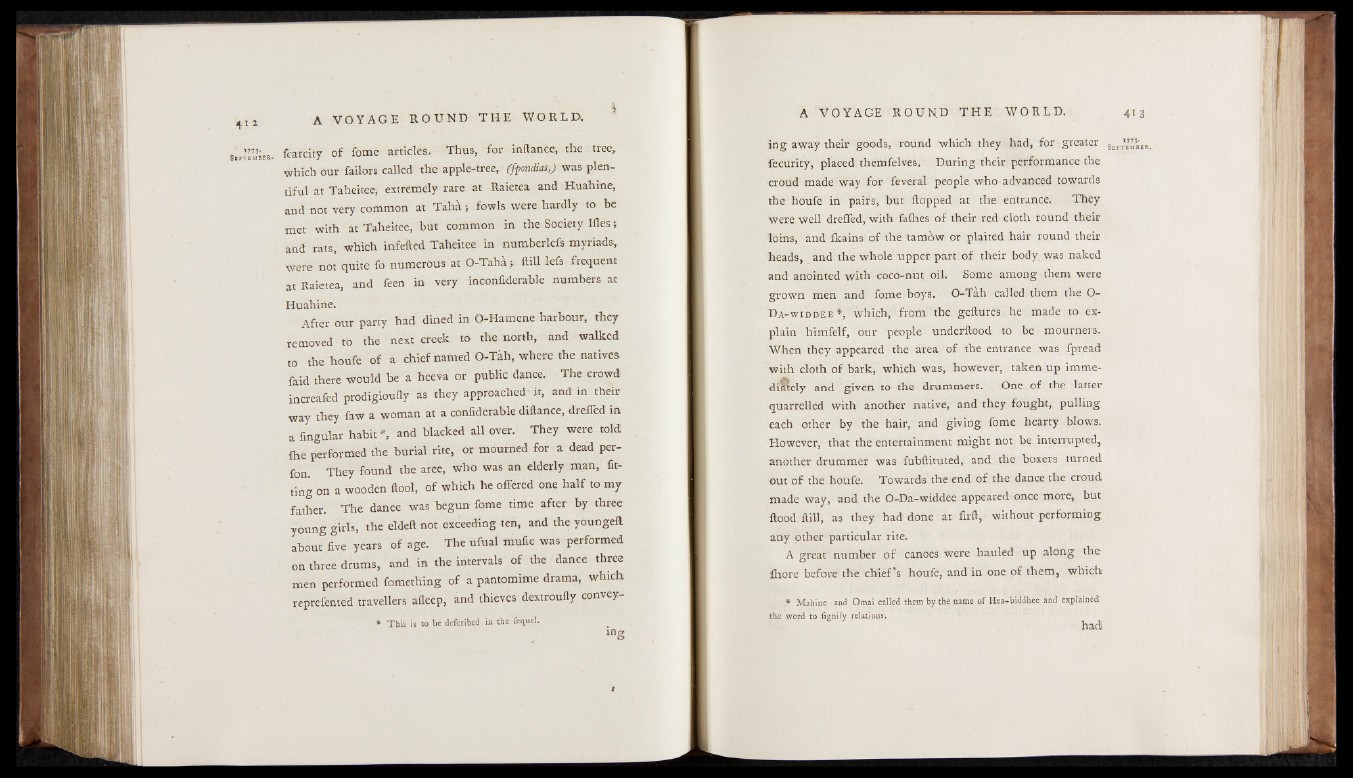
j j l l k . . fcarcity of fome articles. Thus, for inilance, the tree,
which our failors called the apple-tree,' (fpondias,) was plentiful
at Taheitee, extremely rare at Raietea and Huahine,
and not very common at Taha;; fowls were hardly to be
met with at Taheitee, but common in the Society Ifi.es;
and rats, which infefted Taheitee in numberlefs myriads,
were not quite fo numerous at O-Taha -r ftill lefs frequent
at Raietea, and feen in very inconfiderable numbers at
Huahine.
After our party had dined in O-Hamene harbour, they
removed to the next creek to the north, and walked
,o the houfe of a chief named O-Tah, where the natives
faid there would be a heeva or public dance. The crowd
increafed prodigioufly as they approached it, and in their
way they faw a woman at a confiderable diftance, drefied in
a Angular habit*, and blacked all over. They were told
{he performed the burial rite, or mourned for a dead per-
fon. They found the aree, who was an elderly man, fitting
on a wooden ftool, of which he offered one half to my
father. The dance was begun fome time after by three
young girls, the eldeft not exceeding ten, and the youngeft
about five years of age. The ufual mufie was performed
on three drums, and in the intervals of the dance three
men performed fomething of a pantomime drama, which
reprefented travellers afleep, and thieves dextroufly conveying
away their goods, round which they had, for greater
fecurity, placed themfelves. During their performance the
croud made way for feveral people who advanced towards
the houfe in pairs, but flopped at the entrance, They
were well drefied, with fafhes of their red cloth round their
loins, and fkains of the tamow or plaited hair round their
heads, and the whole upper part of their body was naked
and anointed with coco-nut oil. Some among them were
grown men and fome boys. O-Tah called them the O-
D a - w i d d e e * , which, from the geftures he made to explain
himfelf, our people underftood to be mourners.
When they appeared the area of the entrance was fpread
with cloth of bark, which was, however, taken up imme-
diwely and given to the drummers. One of the latter
quarrelled with another native, and they fought, pulling
each other by the hair, and giving fome hearty blows.
However, that the entertainment might not be interrupted,
another drummer was fubftituted, and the boxers turned
out of the houfe. Towards the end of the dance the croud
made way, and the O-Da-widdee appeared once more, but
flood ftill, as they had done at firft, without performing
any other particular rite.
A great number of canoes were hauled up along the
fhore before the chief’s houfe, and in one of them, which
* Mahine and Omai called them by the name of Hea-biddhee and explained
the word to fignify relations..
had
u s i